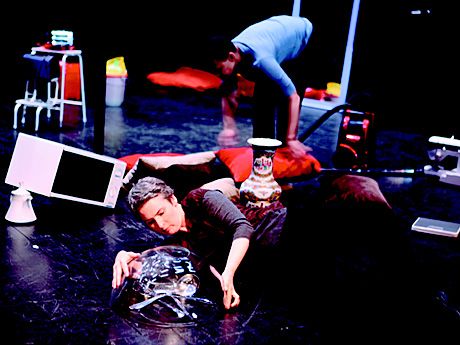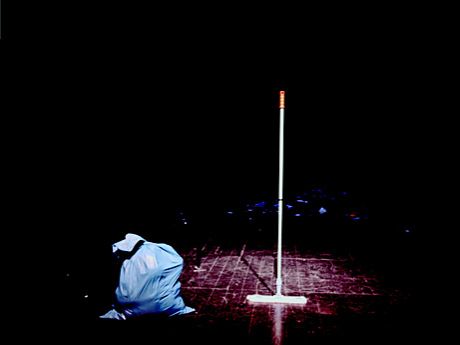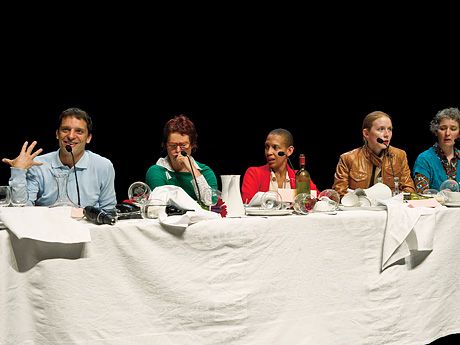Deserve (2010)
Direction: Jorge León & Simone Aughterlony
Created with and performed by: Angelique Willkie,
Céline Peret, Fiona Wright, Mieke Verdin, Thomas Wodianka
Music: George van Dam
Light design: Florian Bach
Set design: Nadia Fistarol
Costumes: Ann Weckx
Sound: Alex Davidson
Technical direction: Ursula Degen
Production: Verein für allgemeines Wohl / Roger Merguin, Niels asbl
Coproduction:
Alkantara, Dampfzentrale/Biennale Bern, Hebbel am Ufer Berlin, Kunstenfestivaldesarts Brussels, Productiehuis Rotterdam (Rotterdamse Schouwburg), Theaterhaus Gessnerallee Zürich, Project coproduced by NXTSTP, with the support of the Culture Programme of the European Union
Supported by:
Pro Helvetia Swiss Arts Foundation, Fachstelle Kultur Kanton Zürich, Präsidialdepartement der Stadt Zürich, German Federal Cultural Foundation, Ministère de la Communauté Française – Service du Théâtre
Thanks to: Damaged Goods, Nicolas Dubois, Anette Ringier
The collaborative project «To Serve», conceived by Jorge León and Simone Aughterlony, finds it’s theatrical expression on stage in Deserve. Integrating imaginative performance material that is shaped by their research into the archetypical representation of the domestic together with documented material from personal experiences, Deserve builds an intimate relationship between testimonies both real and fictional. The characters in Deserve confront personal reflections from domestic workers with an analytical discourse and in doing so shed light on a reality that is normally performed 'behind closed doors'. Jorge and Simone consider the theatrical dimension inherent in this specific power relationship and question the mechanisms at play in the act of serving and being served.
The conditions of servitude and the procession of abuse that accompanies it become inscribed on the body, the body absorbs the duress. And bodies can revolt against the very objects that symbolize their de-humanization. Domestic objects take centre stage then become not only divorced from their position as interface between the server and the served but are reduced to dirt itself: a complete mess that nobody deserves to clean up.
Even though the status of the maid has evolved, what are the layers that lie behind that symbol of servitude and how are they re-enacted in our power relations today? The line between subordination and domination is just as treacherous in contemporary experience and the motives for positioning ourselves and projecting others in one role or the other might be found in the conception of our own and others worthiness.
Program Notes
We are watching «Deserve». A performance with four women and two men, and a machine. There are objects that you would find in any home. These objects do not belong to the characters in the piece or even to the performers: a cake mixer, cutlery, a hot iron, a toaster, a sharp knife. There is a violent episode that we do not see. It has already happened, off stage, elsewhere, but the performers often refer to it. One man plays the violin. There is very little other music, only the violin. And two songs. We hope to hear two songs.
We have been granted access to specific documents. Some details in the documents that we are reading - the given name, country of origin, city of residence, had to be changed and replaced with letters. We can’t say anymore if the letter B stands for Bulgaria, Burkina Faso, Bolzano or Belgium. We don’t know if T was Terry, Tissan, Tamara or Tarek.
We are watching Deserve and we're wondering if a woman on her knees is worth more or less than a man on all fours. We are wondering if dirt under the nails is more or less embarrassing than tears in the eyes. And we are debating whether or not it's indecent to imagine Bernadette as either fat or smelly. Or both.
We have many things we want to say so we reach for many things to say them with and the coat hanger is only one of these things. The coat hanger is often very sad, very melancholic. It’s like a word, a hieroglyph, a sign and if you look at it for long enough, like a word, it really doesn’t mean what you thought it meant after all.
We are watching «Deserve» and we begin to notice that the bodies we see lying over there are ambiguous too. From this distance it’s difficult to say if their stillness tells us something about exhaustion or mere laziness. We also find ourselves on our hands and knees and we find ourselves in the service of another. We witness the twisted intimacy between the domesticated body and the domestic object. We are struck by the potential violence in this relationship. When we imagine the four walls we move inside and the doors we hide behind, when we imagine all the contents of the home and the structure of its occupants we begin to taste a kind of alchemy, a mad and magical potion.
There is an anecdote about a washing machine and there is a famous murder story. We mention things that never appear: le lapin. The two sisters, Papin. We never see them. We speak about fables but we never actually hear one. We speak in English and we speak in French. Also, we raise our voices, we take clothes off, we put clothes on, we look into the audience with... anxiety...
After some time we stage a conference and we imagine there has been a dinner. We do not know who was actually present at the dinner only that some distinguished guests were invited. We remember the childhood game, Cluedo and the characters in the game.
We are watching «Deserve» and we begin to think that the bodies of the objects are trying to tell us something, as if the objects on the stage, like the objects in the house have something to say. We climb a few steps to speak, we leave the mess and disappear, as if we could let the objects speak for us.


